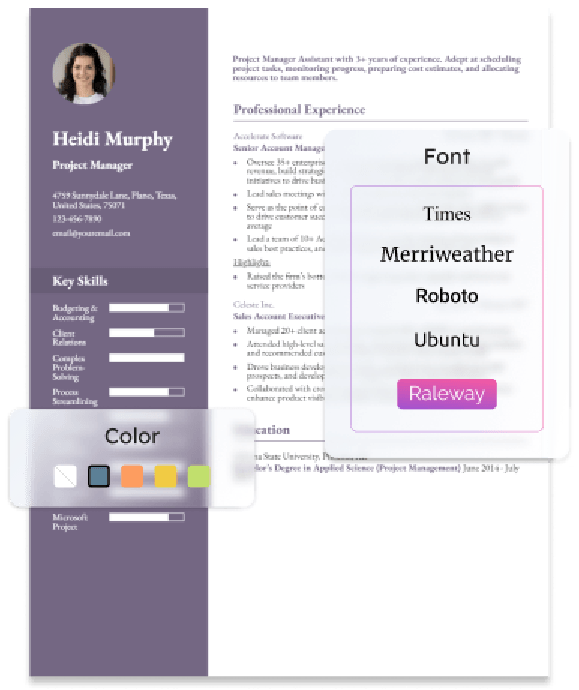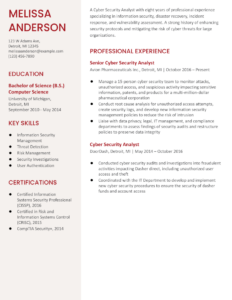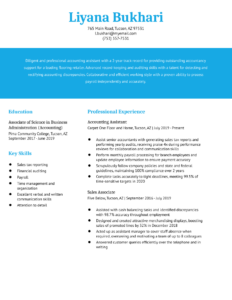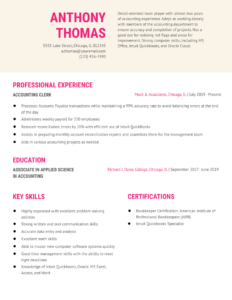How To Write a Clinical Research Associate Resume
To craft an impactful clinical research associate (CRA) resume, showcase your unique background supporting all aspects of clinical trials. Provide specific examples of you identifying opportunities to improve accuracy, transparency, and efficiency. Emphasize your comprehensive knowledge of Good Clinical Practice (GCP) and International Conference on Harmonization (ICH) regulations. This guide will provide expert tips to help you translate your career into an accomplishment-driven CRA resume.
- Entry-level
- Mid-career
- Senior-level
1. Write a dynamic profile summarizing your clinical qualifications
Start your resume with a powerful opening summary that encapsulates your strongest qualifications as a CRA. List your title, years of experience, and three to four specializations in your opening sentence that match the job description. Highlight your expertise in regulatory compliance, patient recruitment, and data reporting for clinical trials. Illustrate your experience collaborating with multi-disciplinary teams to support research initiatives. Emphasize your passion for improving quality of life and driving positive patient outcomes through new clinical discoveries.
Senior-Level Profile Example
A CRA with 10 years of experience, specializing in clinical trial management system (CTMS), electronic document management system (EDMS), regulatory compliance, and SAE reporting. A proven track record of collaborating with multidisciplinary teams to execute complex clinical research initiatives.
Entry-Level Profile Example
A CRA with entry-level experience, specializing in quality control, audits, continuous improvement, and GCP regulations. Adept at analyzing complex data sets and identifying opportunities to enhance the quality of clinical research initiatives.
2. Add your clinical experience with compelling examples
Your professional experience section is the foundation of your resume, and it needs to feature your most compelling achievements to grab the attention of prospective employers. Highlight your contributions and the end results of your research studies. Incorporate key performance indicators (KPIs) to emphasize the success of your clinical trials and enhance the impact of your bullet points. Showcase examples of you implementing new strategies to drive patient recruitment and retention. Feature achievements that illustrate your experience reducing delays associated with internal review boards.
Senior-Level Professional Experience Example
Senior Clinical Research Associate, Heart and Wellness Research Firm, Miami, FL | September 2019 – present
- Coordinate with multidisciplinary research teams to execute clinical trials for cardiology research, including patient enrollment, qualification visits, and site initiation visits (SIV)
- Define strategies for patient recruitment, build strategic partnerships with health care organizations, and develop new recruitment channels, resulting in a 120% increase in patient retention and a 50% reduction in associated recruitment costs
- Establish new documentation review protocols to ensure GCP regulatory compliance and reduce delays associated with institutional review boards (IRB) compliance by 40%
Entry-Level Professional Experience Example
Clinical Research Associate, Arkline Pharmaceuticals, San Francisco, CA | June 2021 – present
- Wrote clinical trial documentation for a pharmaceutical company analyzing the efficacy of a new antidepressant, including consent forms, study protocols, and quality control guidelines
- Ensure compliance with FDA, ICH, and GCP regulations, conduct study audits, develop standard operating procedures (SOPs), and identify opportunities to reduce protocol deviations
- Coordinate with research coordinators to ensure the accuracy and transparency of data
3. Include clinical-related education and certifications
As a CRA, it is best to feature relevant education and industry certifications to show hiring managers you have the regulatory knowledge and experience to succeed in demanding clinical environments. While credentials are not always required, obtaining certifications can help you stand out in a competitive job market. The Certified Clinical Research Associate (CCRA) and Certified Clinical Research Professional (CCRP) designations are both strong options that demonstrate your advanced understanding of clinical research protocols and government regulations.
Education
Template
- [Degree Name]
- [School Name], [City, State Abbreviation] | [Graduation Year]
Example
- Bachelor of Science (B.S.) Clinical Research
- Temple University, Philadelphia, PA | 2016
Certifications
Template
- [Certification Name], [Awarding Organization], [Completion Year]
Example
- CCRP, SORCA | 2020
- CCRA, ACRA | 2017
4. Include a list of skills and proficiencies related to clinical work
Organizations utilize Applicant Tracking Systems (ATS) to identify qualified applicants based on specific keyword requirements. If your document lacks sufficient key terms, you may not advance to the next phase of the hiring process. Incorporating appropriate terminology is also important for making a positive impression on the hiring manager. Feature a mix of regulatory, clinical research, and leadership skills to stand out from the competition. Below, you’ll find a list of potential keywords you may encounter while pursuing CRA positions:
| Key Skills and Proficiencies | |
|---|---|
| Clinical development | Clinical monitoring |
| Clinical research studies | Clinical trials |
| Confidentiality agreements | CTMS |
| Electronic data capture (EDC) | FDA regulations |
| GCP regulations | ICH guidelines |
| IRB submissions | Patient consent forms |
| Patient recruitment | Patient retention |
| Process improvement | Quality control |
| Serious adverse event (SAE) reporting | SIV |
| SOPs | Study protocols |
5. Feature clinical research reporting activities
Another essential aspect of a CRA role is ensuring proper clinical research data reporting throughout the trial. One of the most important types is an SAE, which involves reporting serious injuries, hospitalization, or death of a trial subject. Employers must see you have the expertise to support their organization with all their clinical reporting requirements. Feature your expertise in SAE reporting and CTMS, which research organizations have heavily adopted to centralize data reporting in recent years.
How To Pick the Best Clinical Research Associate Resume Template
When selecting your template, look for a clean, simple format that allows the hiring manager to scan your document for key pieces of information easily. Avoid cluttering your resume with flashy colors, graphics, and overly decorative fonts, as strong visual elements can often distract the reader from your content. Choose a well-organized, single-column template that allows you to deliver a smooth, sequential reading experience.
Clinical Research Associate Text-Only Resume Templates and Examples
- Entry-level
- Mid-career
- Senior-level
Skyler Thompson
(123) 456-7890
[email protected]
123 Pine Brook Dr, Miami, FL 12345
Profile
A Clinical Research Associate with five years of experience, specializing in ensuring compliance with GCP, FDA, and ICH regulations. A strong history of building strategic partnerships and developing strategies to improve patient recruitment and retention.
Professional Experience
Clinical Research Associate, Heart and Wellness Research Firm, Miami, FL
September 2019 – Present
- Coordinate with multidisciplinary research teams to execute clinical trials for cardiology research, including patient enrollment, qualification visits, and site initiation visits
- Define strategies for patient recruitment, build strategic partnerships with healthcare organizations, and develop new recruitment channels, resulting in a 120% increase in patient retention and a 50% reduction in associated recruitment costs
- Establish new documentation review protocols to ensure GCP regulatory compliance and reduce delays associated with IRB compliance by 40%
Clinical Research Associate, St. John’s Medical Center, Miami, FL
May 2017 – September 2019
- Identified investigators, led patient recruitment initiatives, performed site initiatives visits (SIV), and conducted pre-study activities for oncology clinical research trials
- Managed preparation of documentation for IRB submissions and patient enrollment, including study protocols, consent forms, and confidentiality agreements
Education
Bachelor of Science (B.S.) Clinical Research
University of Miami, Miami, FL September 2013 – May 2017
Key Skills
- Patient Recruitment
- Clinical Research Qualification
- Regulatory Compliance
- Clinical Studies
- GCP Regulations
Certifications
- Certified Clinical Research Professional (CCRP), SORCA, 2020
- Certified Clinical Research Associate (CCRA), ACRA, 2017
Frequently Asked Questions: Clinical Research Associate Resume Examples and Advice
What are common action verbs for clinical research associate resumes?-
Running out of action verbs when crafting your resume is easy. There are only a few words to describe your professional experience accurately. This can be especially challenging for health care or pharmaceutical professionals. To help you keep your content fresh and enhance the readability of your bullet points, use these action verbs to convey your work experience:
| Action Verbs | |
|---|---|
| Analyzed | Audited |
| Collaborated | Communicated |
| Conducted | Coordinated |
| Delivered | Developed |
| Diagnosed | Drove |
| Enhanced | Evaluated |
| Executed | Identified |
| Implemented | Improved |
| Interfaced | Led |
| Managed | Oversaw |
| Partnered | Performed |
| Provided | Resolved |
| Supported | |
How do you align your resume with a clinical research associate job description?-
According to the Bureau of Labor Statistics, over 136,800 new openings are projected each year for life, physical, and social science occupations. Despite the above-average growth rate, align your resume with the job description to increase your odds of landing the interview. Carefully analyze each posting and incorporate regulations, clinical terminology, and keywords that match the organization’s research needs.
Showcasing your knowledge of regulatory compliance is important, but also emphasize soft skills. For example, you may want to provide insights into your ability to collaborate with diverse teams and third-party sponsors, as a CRA often interacts with various groups during the clinical trial lifecycle. Demonstrating that you possess the clinical research and communication skills to succeed in the role will help employers see you’re the right fit for their culture and long-term objectives.
What is the best clinical research associate resume format?-
Reverse chronological is the ideal resume format for CRAs. This allows you to place your most recent and relevant work experience towards the top of your document while demonstrating your career progression. At the entry level, you can opt for a combination format in lieu of a robust work history. This places your skills and academic projects above your professional experience but allows you to tell your story using detailed bullet points.
Craft your perfect resume in minutes
Get 2x more interviews with Resume Builder. Access Pro Plan features for a limited time!

Craft a matching cover letter to strengthen your job application. Carefully tailor your cover letter to each individual job application. Mention something specific about the organization’s mission statement, reputation, or research accomplishments and why this draws you to apply for the role. For more insights, visit our research assistant cover letter guide.







